Regional News
Bangkok Residents Warned to Brace for Hazardous PM2.5 Dust Levels

Thailand’s Pollution Control Department (PCD) has urged Bangkok residents to brace for a rise in hazardous PM2.5 dust levels this weekend.
The surge of PM2.5 is caused by climate patterns, particularly the current lack of air circulation to disperse the particles, Atthapol Charoenchansa, director-general of the PCD told media.
“So from today until Sunday, air quality in Bangkok and its vicinity fall to levels that affect health,” said Mr Atthapol, who suggested that people should avoid outdoor activities and wear dust filtering face masks if possible.
Data from the PCD’s Center for Air Pollution Mitigation on Friday showed air quality in 34 out of 50 districts in the capital exceeded the PCD’s permissive level of 50 microgrammes per cubic metre (µg/m³), which is double the World Health Organisation’s recommendation.
The highest level of 68 µg/m³, as of 6pm on Friday, was detected in Nong Khaem district on the outskirts of Bangkok.
Excessive PM2.5 levels were also recorded in Phra Pradaeng district of Samut Prakan, tambon Om Noi in Krathum Baen district of Samut Sakhon and near Samut Sakhon Hospital in Muang district of the province where the level reached as high as 69 µg/m³.
Last month, Bangkok governor Aswin Kwanmuang announced a ban on lorries using city roads in daylight hours, but the policy was thwarted after operators threatened legal action.
High Levels of PM2.5
Who needs to take steps to reduce exposure when PM2.5 levels are “hazardous”
Everyone needs to take steps to protect themselves when pollution levels are “hazardous” and above. Some people are at higher risk from PM2.5 exposure. People most at risk from particle pollution exposure include those with heart or lung disease (including asthma and chronic obstructive pulmonary disease-COPD), older adults, and children. Research indicates that pregnant women, newborns, and people with certain health conditions, such as obesity or diabetes, also may be more susceptible to PM-related effects.
Not sure if the heart disease category applies to you?
People with heart disease includes all people with known coronary artery disease, ischemic heart disease, history of angina and/or heart attack, stent placement, by-pass operation, heart failure, ventricular arrhythmia, peripheral vascular disease, history of stroke, transient ischemic attack (TIA), or cerebrovascular disease. This group also includes older adults, because they are more likely to have undiagnosed cardiovascular disease, along with people with multiple risk factors for cardiovascular disease, such as high blood pressure, elevated cholesterol, smoking, and diabetes.
Why are children more at risk?
Children are more likely to be exposed to air pollution, because they often spend more time outdoors engaged in activity and play, and they breathe more air per pound of body weight than adults. They are more susceptible to the effects of air pollution, because their airways are still developing. In addition, children are more likely than adults to have asthma, which increases their risk.
If you are in an at-risk group, if you have heart or lung disease, if you are an older adult, or if you have children, talk with your doctor in advance about when and whether you should leave the area or move to a location with better indoor air quality. When PM2.5 concentrations are high for a prolonged period of time, fine particles can build up indoors even though you may not be able to see them.
If you are in an at-risk group, don’t wait until pollution reaches the “hazardous” category to take action to reduce your exposure. Air quality is unhealthy for you when particle pollution levels reach the “unhealthy for sensitive groups” range, so you will need to take steps to reduce your exposure earlier and more often. If you are healthy, begin taking steps when air pollution reaches the “unhealthy” category.
How can I tell if particle pollution is affecting me?
- Even if you are healthy, you may experience temporary symptoms such as irritation of the eyes, nose, and throat; coughing; phlegm; chest tightness; and shortness of breath. These symptoms should go away when air quality improves.
- If you have lung disease – including asthma and COPD – you may not be able to breathe as deeply or as vigorously as normal, and you may experience coughing, chest discomfort, wheezing, shortness of breath, and unusual fatigue. Make sure you follow your doctor’s directions about taking your medicines and following your asthma management plan. If you have any of these symptoms, reduce your exposure to particles and follow your doctor’s advice. Contact your doctor if symptoms persist or worsen.
- If you have heart or vascular disease, particle exposure can cause serious problems – including worsening of your disease – in a short period of time. Do not assume that you are safe just because you do not have symptoms.
Symptoms that may indicate a serious heart problem include:
Chest discomfort (uncomfortable pressure, fullness, squeezing, or pain in the center of the chest that lasts more than a few minutes or goes away and comes back), discomfort in other areas of the upper body (pain or discomfort in one or both arms, the back, neck, jaw or stomach), shortness of breath, or other signs may include breaking out in a cold sweat, nausea or light-headedness. Seek emergency medical treatment if you experience these symptoms.
Symptoms of a stroke include:
Sudden numbness or weakness (in the face, arm or legs especially on one side of the body), confusion, trouble speaking or understanding, problems seeing in one or both eyes, dizziness, loss of balance or coordination or trouble walking, or severe headache with no known cause may indicate symptoms of a stroke. Seek emergency medical treatment if you experience these symptoms.






























